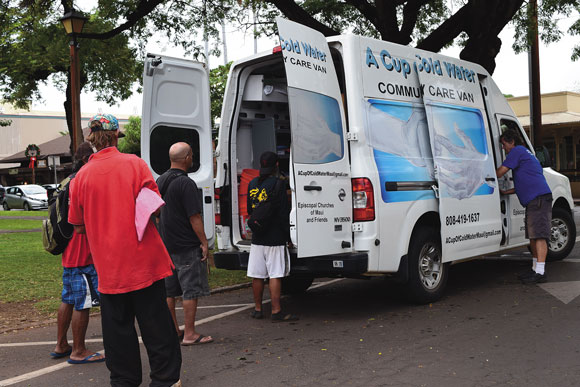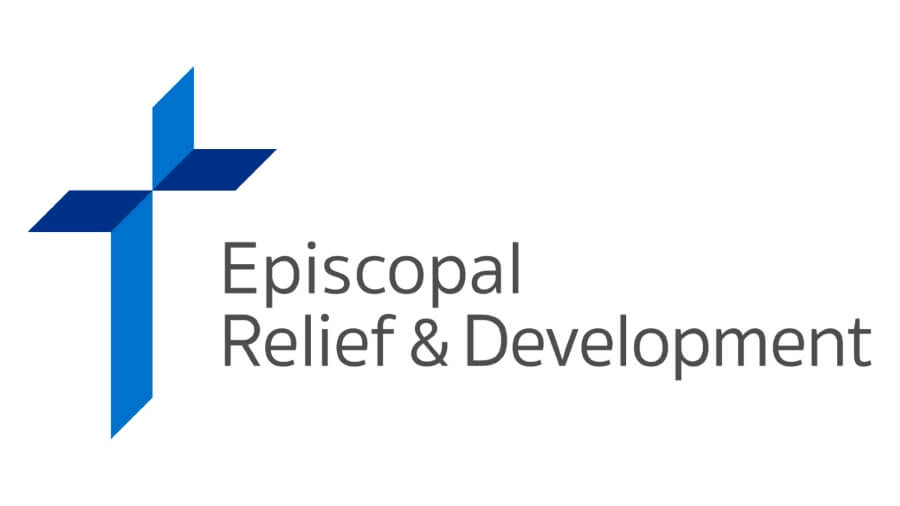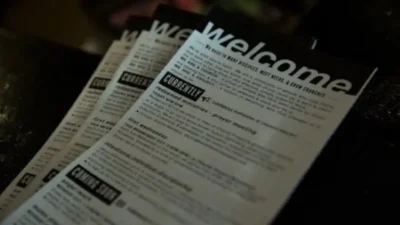[Episcopal News Service] The Diocese of Hawaiʻi’s mobile homeless assistance ministry is providing direct assistance on the island of Maui to residents who’ve lost their homes in the wildfires that have killed at least 106 people and destroyed more than 2,200 buildings, most of which were residential.
Volunteers from A Cup of Cold Water, the diocese’s Maui-based community outreach program, have been driving a van around the island to distribute toiletries, food and pet food, bottled water, clothing and other necessities to displaced people since a day after the wildfires started on August 8, 2023.
Wildfires on Maui
Wildfires on Maui prompted the evacuation of more than 32,000 residents and tourists. More than 1,000 people remain missing.
The worst of the damage was experienced by Maui’s western community of Lāhainā, population 12,700, where the now confirmed destroyed Holy Innocents Episcopal Church building had stood in historic Lāhainā town since 1927.
Diocesan leaders are still trying to contact members of Holy Innocents to make sure everyone is safe and has access to shelter and other immediate needs. Once everyone is accounted for, the diocese will assess the best ways to approach the cleanup process.
“Those I’ve been in contact with are mostly displaced as their homes were demolished by the fire,” the Rev. Bruce DeGooyer, vicar of Holy Innocents, told Episcopal News Service by email. “It is overwhelming here.”
Response by A Cup of Cold Water
Deb Lynch, president of A Cup of Cold Water, told ENS (Episcopal News Service) that the nonprofit typically has 30 volunteers, but approximately 99 people have asked to volunteer since the wildfires started. The volunteers have been needing special permission from authorities blocking the roads to enter Lāhainā to distribute goods to people still there, but they haven’t always been able to enter.
“There’s a great outpouring of love and compassion here,” she said. “We’re all really good at trying to help each other through this disaster. There is so much devastation, but so much love and compassion at the same time.”
A Cup of Cold Water is a volunteer collaboration between Maui’s four Episcopal churches: Church of the Good Shepherd in Wailuku, St. John’s Episcopal Church in Kula, Trinity Episcopal Church By-the-Sea in Kihei and Holy Innocents Episcopal.
Towels, water, food and blankets have been the most requested items since the wildfires started, Lynch said.
The Rev. Heather Mueller, who was ordained at Holy Innocents in 1981, told ENS that A Cup of Cold Water receives many donations from hotels throughout Maui, such as towels, soap and small bottles of shampoo and conditioner. Volunteers will also buy items at the Costco in Kahului. Some volunteers are staying in her home as they continue helping displaced residents.

“[Lāhainā residents] have lost everything — their homes, their jobs, their livelihood,” Mueller said. “But so many people here are doing great things to help.”
Response by Bishop Robert Fitzpatrick of Hawaiʻi
Hawaiʻi Bishop Robert Fitzpatrick was scheduled to fly to Maui on August 15 and participate in an ecumenical prayer service. Before leaving Honolulu, where the diocese is headquartered on the island of Oʻahu, Fitzpatrick told ENS that there is still no access to Lāhainā, where only 25% of the burn areas have been searched so far. Lāhainā was a capital of the Kingdom of Hawaiʻi before it was moved to Honolulu in 1850.
Fires worsened by Hurricane Dora
Last week’s fires were impelled by strong winds brushing through dry vegetation as Hurricane Dora, a Category 4 cyclone, passed near Hawaiʻi without making landfall. The islands of Hawaiʻi and Oʻahu also experienced wildfires, albeit to much lesser extents than Maui. Hurricane Dora became a typhoon on August 12. Researchers say human-induced climate change, desertification and non-native grass species contributed to the severity of the Maui wildfires.
The Lāhainā wildfire is the deadliest in U.S. history since the 1918 Cloquet fire that killed 453 people in northern Minnesota and the deadliest natural disaster in Hawaiʻi since the 1946 tsunami that killed more than 150 people.
Help coordination
The Hawaiʻi diocese is coordinating immediate relief efforts through A Cup of Cold Water and the bishop’s pastoral fund.
Donations made to the US Disaster Fund will fund Episcopal Relief & Development and its partners’ assistance efforts. Episcopal Relief & Development has also established a designated Hawaiʻi Emergency Respond Fund to directly provide support in collaboration with local partners.
Lynch said that financially supporting organizations like A Cup of Cold Water is one of the easiest ways for Episcopalians to help Maui residents who’ve been impacted by the wildfires.
“A Cup of Cold Water here in Maui is a good example of Episcopalians being able to do outreach in a community and be able to share compassion and love and involve their congregations in being able to help other humans,” Lynch said.
-Shireen Korkzan is a reporter and assistant editor for Episcopal News Service. She can be reached at skorkzan@episcopalchurch.org.

A Cup of Cold Water
A Cup of Cold Water (ACCW) is a community care-van outreach program on the Island of Maui, formed by a group of committed Episcopalians from Good Shepherd, Holy Innocents, St. John’s and Trinity By-the-Sea. The program is a food and clothing distribution service for the poor and needy in the community, and uses the care-van to deliver essential food, hygiene and clothing items throughout the island. With a strong volunteer base from the Episcopal Churches on Maui, the program has grown into a hugely successful outreach ministry for the island that includes churches from various denominations, organizations and volunteers from around the wider community.

Episcopal Relief & Development
Episcopal Relief & Development works in collaboration with church partners and other local organizations to facilitate healthier, more fulfilling lives in communities that are struggling with hunger, poverty, disaster and disease. We also work around the world and here in the US responding to and rebuilding after disasters.
Our programs impact the lives of over 3 million people annually. We respect the dignity of all people and view them as our neighbors, working alongside participants regardless of religious affiliation or background.
Our unique expertise, experience and practical knowledge allow us to guide communities to lasting change with a focus on three key priorities:
- Women
- Children
- Climate
In our disaster response and recovery work, we offer resources and training to help people prepare for disasters and provide support so vulnerable people can make a full and sustained recovery.
Our integrated strategies are developed in collaboration with local partners and communities to help ensure the results we generate are sustained over the long-term.

The Diocese of Hawai‘i
The Episcopal Diocese of Hawai‘i consists of 35 worshipping communities on five islands. About half of these can be found on the island of O‘ahu, where Honolulu, the capital of Hawai‘i, is located. Other churches are distributed on the islands of Kaua‘i, Maui, Moloka‘i, and Hawai‘i Island (“the Big Island”).

Church of the Redeemer
Church of the Redeemer: Worshiping God, living in community, and reaching out to the world around us. We are an Episcopal Church serving north King County and south Snohomish County, Washington. As you travel your road, go with friends walking the way of Jesus at Redeemer.
Church of the Redeemer is at 6210 Northeast 181st Street in Kenmore, Washington. The campus is a short distance north of Bothell Way, near the Burke-Gilman Trail. The entrance looks like a gravel driveway. The campus is larger on the inside than it is on the outside. And we managed to hide a large building on the side of a hill that is not easily seen from the street.
The Episcopal Church welcomes you.





